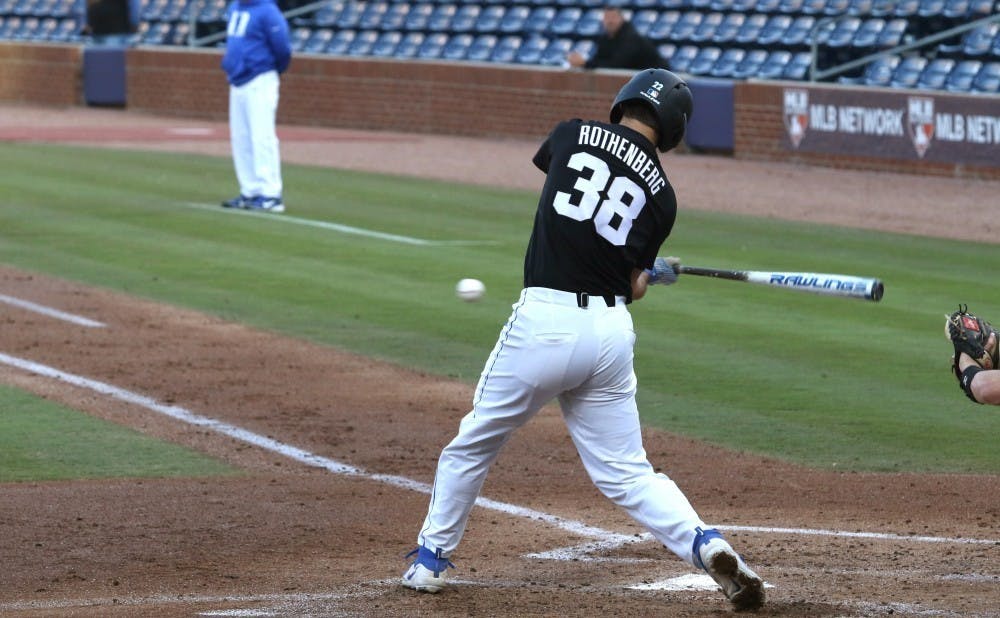Duke baseball picked the perfect time to break back onto the national stage.
Thursday night, MLB and the MLB Players Association reached an agreement on a deal that may forever alter the course of professional and college baseball.
In exchange for guaranteed service time and $170 million in pay if the season is not played—a prospect that looks increasingly likely—the MLBPA agreed to forgo the ability to sue for lost wages, to allow the owners to shorten the 2020 first-year player draft to as few as five rounds and the 2021 draft to as few as 20 rounds and to delay the next two international signing periods to start in January.
There is little way to interpret this deal other than as a success for major leaguers, a potentially lasting victory for owners and a resounding loss for high school, college and low-minor league players. The owners and commissioner's office have been trying for some time to reduce the number of minor league teams they contract, and a significantly reduced draft for the next two years provides the impetus for that development. Who’s going to play on the two or three short-season teams every team has? Where will those 600+ players come from?
Even if this deal doesn’t result in rookie and low-A minor leagues shutting down, it will still result in many prospective professional players leaving the sport, since undrafted players will only be able to sign for $20,000 (the top slot in the sixth round last year could’ve signed for over 15 times as much.)
That’s big news for Duke baseball. Fifteen guys on the roster are juniors or seniors, the years you would normally expect a Duke player to get drafted, many of whom had hopes of putting up good seasons and getting drafted. But if the draft only has five rounds this July, then Matt Mervis and Eli Herrick won’t be able to improve their draft stock and payday, and Thomas Girard won’t be able to have the kind of season that lands him on MLB radars.
The only two Blue Devils likely to get drafted this summer then are pitcher Bryce Jarvis and catcher Michael Rothenberg. Projected as a mid-second-rounder and a late-fourth-rounder by FanGraphs, respectively, it would be surprising to see either don the blue and white next year (though as upperclassmen who can only be drafted under the reduced-length drafts, they have less negotiation leverage and could wind up shortchanged).
As many as eleven significant upperclassmen could still be lacing up for Duke next year. Only N.C. State and Pittsburgh are good bets to return more impact veterans. The Blue Devils should return eight starting hitters and the entire bullpen, good news for a team that had its sights set on Omaha this year.
Not many specifics are known around the extra year of eligibility the NCAA is granting to spring athletes, though a vote is expected regarding the issue by the end of March. Whatever details do emerge in the coming weeks may drastically affect the prospects of returning upperclassmen, especially since scholarship limits have yet to be determined as well.
No Duke players could be reached for comment on the changing MLB Draft rules.
Complicating this all even more is the recruiting landscape of the next couple of years. The already-inexact science of which high schoolers get drafted and which go to college was bound to get even less exact before, as three recruiting classes (2019-21) have had one of their most important seasons knocked out by the coronavirus pandemic. Add in the reduction in draft size, and the amount of high school talent matriculating to college should skyrocket, possibly permanently.
Now this doesn’t mean that Jordan Walker, Class of 2020 Duke commit and one of the top high school prospects in the country, is going to lace up for the Blue Devils, as several million dollars in signing bonus still await him atop the draft. But as many as five Duke recruits could’ve been drafted in July and probably won’t be if the draft is only five rounds. That’s good news for the Blue Devils, as many of the ACC schools with better incoming freshman classes than Duke will lose much more talent to the pros.
Adding in recent discussions about eliminating international free agency and rolling international prospects into the first-year player draft, even more high school talent could be pushed into the college ranks if the draft is permanently shortened. Both NCAA and Duke baseball could reach a level of play we haven’t seen before.
Get The Chronicle straight to your inbox
Signup for our weekly newsletter. Cancel at any time.

